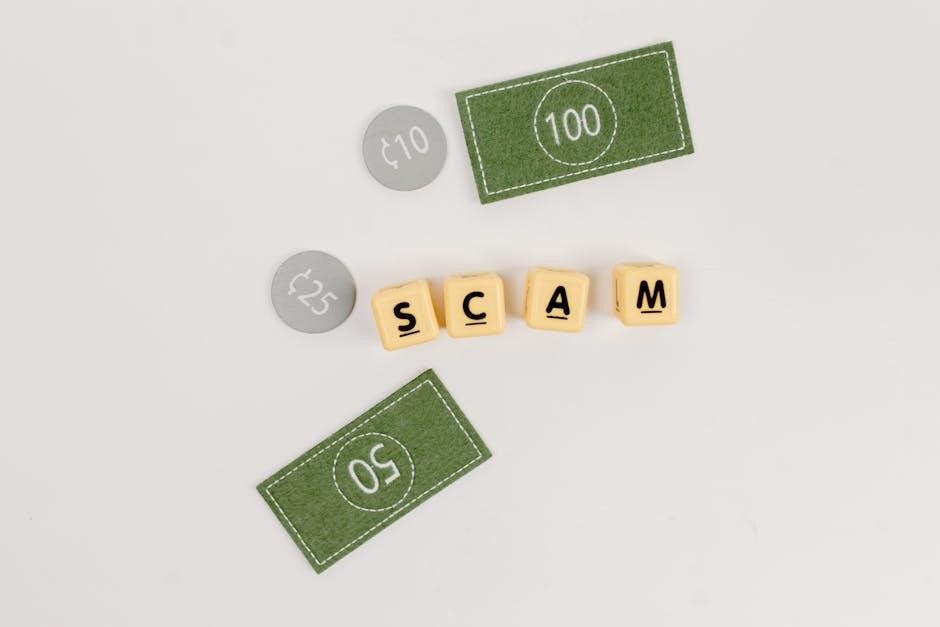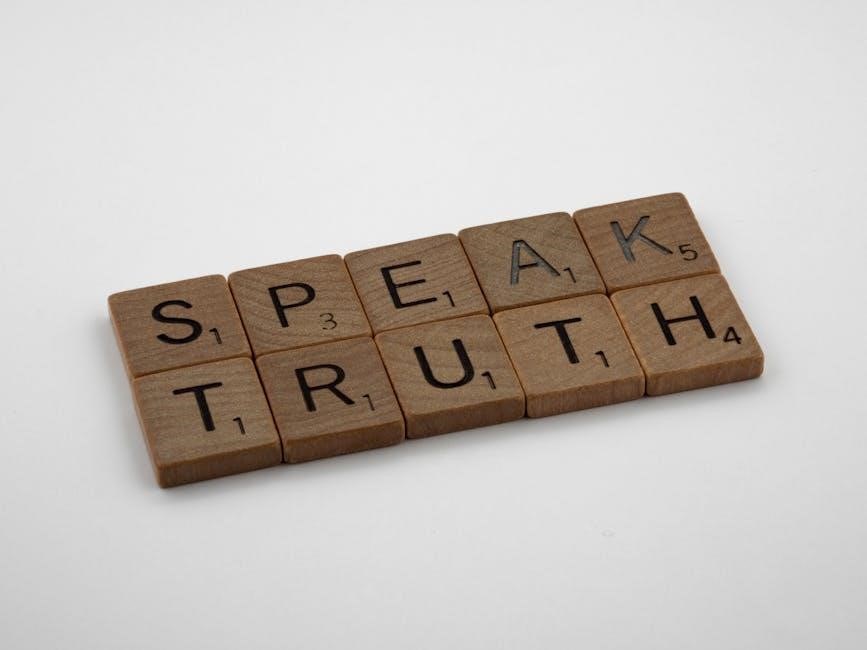Dishonesty, a pervasive human behavior, manifests in various forms, from minor deceptions to significant ethical violations, driven by self-interest, fear, and social pressures, impacting individuals and societies profoundly.
1.1 Definition and Scope
Dishonesty refers to the deliberate misrepresentation of reality, encompassing lies, fraud, and unethical behavior. Its scope spans personal, professional, and societal domains, driven by self-interest, fear, and social pressures. According to Dan Ariely, dishonesty is prevalent yet often justified by individuals to maintain a positive self-image, highlighting its complex and widespread nature in human behavior and decision-making processes.
1.2 The Prevalence of Dishonesty in Society
Dishonesty is a widespread issue across societies, manifesting in various forms, from minor lies to large-scale fraud. It pervades personal relationships, workplaces, and political landscapes, often driven by self-interest and fear. Research by Dan Ariely highlights its ubiquity, showing that dishonesty is not limited to criminals but is a common behavior among ordinary individuals, making it a significant societal challenge with profound implications.

The Psychology Behind Dishonesty
Dishonesty stems from a complex interplay of motivations, self-perception, and environmental factors. It involves balancing self-interest with maintaining a positive self-image, often through mental tricks that justify deceptive actions. Fear, such as fear of consequences or failure, drives individuals to lie, while societal norms can make dishonesty seem acceptable. Understanding these psychological mechanisms is crucial for developing strategies to reduce dishonest behavior and promote integrity.
2.1 Motivations for Dishonest Behavior
Individuals engage in dishonest behavior for various reasons, including financial gain, personal advantage, and fear of consequences. Self-interest often drives such actions, as people seek to maximize benefits while minimizing risks. Additionally, social pressures and the desire to maintain a positive self-image play significant roles. Dishonesty can also stem from a need to fit into certain groups or to avoid punishment, highlighting the complex motivational factors at play.
2.2 The Role of Self-Interest and Fear
Self-interest is a primary driver of dishonest behavior, as individuals often act to maximize personal benefits while minimizing risks. Fear, whether of punishment, rejection, or loss, further fuels dishonesty by motivating people to bending the truth or engaging in unethical actions to avoid negative outcomes. These factors often override moral considerations, leading individuals to prioritize immediate gains over long-term integrity and societal well-being.
2.3 Social Pressures and Dishonesty
Social pressures significantly influence dishonesty, as individuals often conform to group norms or expectations to gain acceptance. The desire to fit in or avoid rejection can lead people to compromise their ethical standards. Additionally, observing others engaging in dishonest behavior can normalize such actions, creating a ripple effect that perpetuates dishonesty within social circles and broader communities, making it a deeply ingrained issue in human behavior.

The Mechanisms of Dishonesty
Dishonesty often operates through inattention to consequences and moral disengagement, allowing individuals to act unethically while maintaining a positive self-image, as explored in “The Truth About Dishonesty.”
3.1 Inattention to Consequences
Inattention to consequences enables dishonesty by allowing individuals to overlook the harm caused by their actions. This psychological mechanism permits people to act unethically while maintaining a positive self-view, as explored in “The Truth About Dishonesty.” By focusing on immediate gains rather than long-term repercussions, individuals rationalize their dishonest behavior, fostering a disconnect between their actions and the broader ethical implications.
3.2 Moral Disengagement and Self-Deception
Moral disengagement and self-deception are powerful mechanisms that facilitate dishonesty. Individuals justify unethical actions by distancing themselves from moral responsibility, often through cognitive distortions. Self-deception allows people to maintain a positive self-image while engaging in dishonest behavior, as discussed in “The Truth About Dishonesty.” This mental compartmentalization enables individuals to rationalize their actions, thus avoiding feelings of guilt or remorse associated with deceit.

Experiments and Studies on Dishonesty
Experiments like the matrix task reveal that dishonesty is widespread, with individuals often engaging in minor dishonesty when given the opportunity, as shown in Ariely’s research.
4.1 The Matrix Task Experiments
The Matrix Task Experiments, conducted by Dan Ariely, demonstrated that most participants cheated when given the chance, highlighting how dishonesty is a common yet controlled behavior. These studies showed that individuals often justify small lies to themselves, maintaining a positive self-image while benefiting from dishonest actions. The experiments revealed consistent patterns of dishonesty across different settings and populations, providing insights into human behavior and ethics.
4.2 Insights from Behavioral Economics
Behavioral economics offers unique perspectives on dishonesty, revealing how psychological biases and external factors influence unethical decisions. Concepts like loss aversion and self-deception explain why individuals often cheat without severe guilt. These insights highlight the role of context in shaping behavior, suggesting that small environmental changes can significantly reduce dishonesty and promote honesty in various settings, from personal interactions to professional environments.
The Consequences of Dishonesty
Dishonesty erodes trust, damaging relationships and reputations, while also causing emotional distress and guilt for individuals. It undermines institutions, fostering societal distrust and economic instability over time.
5.1 Impact on Individuals
Dishonesty profoundly affects individuals, causing emotional distress, guilt, and erosion of self-respect. It strains personal relationships, fosters distrust, and often leads to a cycle of deceit, further complicating mental well-being and personal growth.
5.2 Impact on Society and Institutions
Dishonesty erodes trust in institutions, undermining societal stability and cohesion. It fosters corruption, weakens governance, and destabilizes economic systems, leading to widespread financial losses and public distrust. Dishonest practices in organizations damage reputations, reduce accountability, and hinder progress, ultimately threatening the legitimacy of social structures and the effectiveness of governance systems.
Building Integrity and Reducing Dishonesty
Building integrity involves fostering honesty through transparency, accountability, and ethical leadership. Strategies include promoting moral awareness, encouraging open communication, and rewarding truthful behavior, as highlighted by Ariely.
6.1 Strategies for Promoting Honesty
Strategies for promoting honesty include fostering transparency, encouraging open communication, and setting clear ethical expectations. Leaders can create environments where honesty is rewarded, reducing fear of consequences. Psychological insights, such as addressing self-deception and moral disengagement, can help individuals align actions with values. Small, consistent efforts to promote truthfulness can lead to significant cultural shifts, as highlighted in research on dishonesty and behavioral change.
6.2 The Role of Leadership and Governance
Leadership plays a crucial role in fostering honesty by setting ethical standards and modeling truthful behavior. Governance structures should promote accountability and transparency, ensuring consequences for dishonesty. Leaders who prioritize integrity create cultures where honesty is valued and encouraged. Effective governance also involves empowering individuals to speak up without fear, fostering an environment of trust and ethical decision-making at all levels of an organization.

The Role of Social Norms in Dishonesty
Social norms significantly influence dishonest behavior by normalizing unethical actions. When dishonesty is perceived as common, individuals often feel less guilty, fostering a culture of acceptance and misconduct.
7.1 How Social Norms Influence Behavior
Social norms profoundly shape behavior by normalizing dishonesty. When dishonest actions are perceived as common, individuals feel less guilt, as societal acceptance reduces the stigma of unethical conduct. The influence of others’ behavior often leads to conformity, making dishonesty seem acceptable in certain contexts. This collective mindset fosters a culture where unethical practices thrive, as individuals align their actions with perceived group norms rather than moral principles. Dishonesty becomes embedded in societal fabric when norms condone or ignore such behavior, perpetuating cycles of misconduct and eroding trust within communities. The power of social norms lies in their ability to redefine what is considered acceptable, often leading individuals to compromise their values without realizing the broader implications.
7.2 The Power of Norms in Shaping Dishonesty
Social norms create a false sense of acceptability for dishonesty. When dishonest behavior is perceived as common, individuals feel less guilt, as societal validation reduces the stigma. Norms drive conformity, leading people to act unethically if they believe others do the same. This collective dynamic erodes trust and integrity, fostering environments where dishonesty thrives. The power of norms lies in their ability to normalize misconduct, making it seem harmless, even though it undermines societal cohesion and ethical standards over time.

Dishonesty in the Digital Age
Technology enables new forms of dishonesty, such as cyber deception and online fraud, exploiting anonymity and connectivity to manipulate trust and reality in unprecedented ways.
8.1 New Forms of Dishonesty in the Digital World
The digital age has given rise to innovative forms of dishonesty, such as identity theft, online fraud, and manipulation of digital information. These new methods exploit the anonymity and connectivity of the internet, allowing individuals to deceive with greater ease and reach. Tools like deepfakes and phishing schemes further enable dishonest practices, creating challenges for trust and verification in the digital realm.
8.2 The Challenge of Cyber Deception
Cyber deception has emerged as a significant challenge, with techniques like phishing, identity theft, and deepfakes exploiting digital platforms. These methods manipulate trust and confidentiality, creating complex security threats. The anonymity of the internet amplifies dishonesty, making it harder to trace and prosecute offenders. Addressing cyber deception requires advanced technological solutions and heightened awareness to combat evolving fraudulent strategies effectively in the digital landscape.

Case Studies of Dishonesty
Historical and modern examples reveal the complexities of dishonesty, from fraudulent corporate practices to everyday deceptions, illustrating its widespread impact and the mechanisms that drive such behavior.
9.1 Historical Cases of Dishonesty
Historical cases of dishonesty reveal recurring patterns of deception, such as the South Sea Company bubble and Ponzi schemes, highlighting greed and manipulation. These examples illustrate how dishonesty has long been a part of human behavior, driven by self-interest and social pressures, with individuals and institutions exploiting trust for personal gain, leaving lasting impacts on economies and societies.
9.2 Modern-Day Examples and Their Implications
Modern dishonesty is evident in corporate scandals like Enron and Volkswagen, where deceit led to financial ruin. Digital fraud and identity theft thrive, exploiting technological gaps. These cases underscore the adaptability of dishonesty, evolving with society’s advancements, causing widespread trust erosion and highlighting the urgent need for ethical frameworks to combat contemporary deceptive practices effectively.

Overcoming Dishonesty
Overcoming dishonesty requires fostering self-awareness, accountability, and ethical norms, promoting honesty through transparent systems and leadership, while addressing root causes like fear and self-interest effectively.
10.1 Practical Steps for Individuals
Individuals can combat dishonesty by fostering self-awareness, embracing accountability, and setting clear ethical boundaries. Practical steps include practicing honesty in daily interactions, journaling to reflect on moral choices, and seeking feedback to identify blind spots. Encouraging transparency in personal and professional relationships also helps mitigate dishonest tendencies. Additionally, cultivating empathy and understanding the root causes of dishonesty, such as fear or self-interest, can empower individuals to make more ethical decisions consistently.
10.2 Organizational Strategies for Integrity
Organizations can foster integrity by promoting transparency, ethical leadership, and accountability. Implementing clear policies, training programs, and reward systems that value honesty encourages truthful behavior. Leaders should model ethical conduct, while feedback mechanisms and whistle-blower protections can deter dishonesty. Regular audits and performance reviews focusing on ethical practices further strengthen organizational integrity, creating a culture where honesty is prioritized and dishonesty is minimized effectively.

The Economic Impact of Dishonesty
Dishonesty leads to significant financial losses, fraud, and economic instability, undermining trust in markets and institutions while creating systemic risks that affect global economic stability and growth.
11.1 Financial Consequences of Dishonesty
Dishonesty leads to significant financial losses through fraud, embezzlement, and unethical practices, damaging market trust and creating economic instability. It disrupts growth, increases inequality, and imposes systemic risks on industries and economies, ultimately costing individuals and societies billions annually in lost revenue and opportunities. Financial dishonesty also undermines investor confidence and destabilizes economic systems, perpetuating cycles of distrust and financial insecurity globally.
11.2 The Cost to Markets and Economies
Dishonesty erodes market integrity, undermining trust and stability. It discourages investment, distorts competition, and disrupts economic growth. Fraudulent activities and unethical practices lead to market inefficiencies, inflate risks, and create systemic vulnerabilities. The collective impact of dishonesty burdens economies with increased inequality, reduced innovation, and weakened institutional frameworks, ultimately threatening global economic stability and long-term prosperity. Its ripple effects perpetuate cycles of distrust, stifling economic potential and social progress.

Ethical Considerations
Ethical considerations highlight the moral implications of dishonesty, emphasizing the importance of integrity and trust in fostering a just and equitable society, essential for human well-being.
12.1 The Moral Implications of Dishonesty
Dishonesty undermines trust and integrity, eroding moral foundations. It fosters a culture of deception, where self-interest prevails over ethical behavior, leading to societal fragmentation and diminished respect for truth and fairness.
12.2 The Importance of Ethics in Modern Society
Ethics form the backbone of modern society, fostering trust, integrity, and fairness. They promote honesty and accountability, essential for individual and collective progress. Without ethical standards, societies risk moral decay, eroding trust in institutions and relationships. Upholding ethics ensures a just and equitable world, guiding behavior and decision-making for the greater good.
The Future of Honesty
The future of honesty lies in understanding dishonesty’s mechanisms, fostering trust, and promoting ethical cultures. Education and awareness can curb dishonesty, creating a more transparent society.
13.1 Trends in Promoting Honesty
Emerging trends emphasize transparency, ethical education, and behavioral nudges to foster honesty. Research highlights the role of societal norms and institutional accountability in reducing dishonesty, promoting trust and integrity across sectors.
13.2 Potential Solutions to Reduce Dishonesty
Strategies include fostering transparency, enhancing ethical education, and implementing policies that promote accountability. Encouraging leadership to model honest behavior and utilizing behavioral nudges can also mitigate dishonesty. Addressing root causes like fear and self-interest through supportive environments and incentives for honesty are crucial steps toward building a more integrity-driven society.
Dishonesty is a complex issue rooted in human psychology and societal influences. Understanding its causes and consequences is essential for fostering integrity and ethical behavior across all domains.
14.1 Summary of Key Findings
Dishonesty is influenced by psychological, social, and situational factors, often driven by self-interest, fear, and social pressures. Studies reveal that individuals balance truth with self-serving behaviors, rationalizing actions to maintain a positive self-image. Experiments, such as the matrix task, demonstrate how dishonesty can escalate when consequences are obscured. Understanding these dynamics is crucial for addressing dishonesty effectively, promoting transparency, and fostering ethical behavior in individuals and organizations alike.
14.2 The Importance of Understanding Dishonesty
Understanding dishonesty is vital for fostering integrity and trust in individuals and society. By recognizing its psychological and social roots, we can develop strategies to mitigate its impact. Addressing dishonesty promotes ethical behavior, strengthens institutions, and cultivates a culture of honesty, essential for personal and collective well-being. This knowledge empowers individuals and organizations to make informed decisions, fostering a more transparent and morally sound world.
